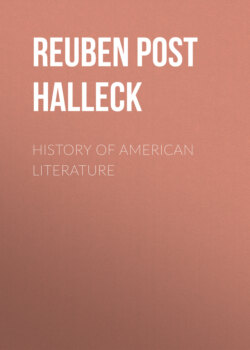Читать книгу History of American Literature - Reuben Post Halleck - Страница 21
На сайте Литреса книга снята с продажи.
LEADING HISTORICAL FACTS
ОглавлениеVirginia and Massachusetts produced the most of our colonial literature. There were, however, thirteen colonies stretched along the seaboard from Georgia (1733), the last to be founded, to Canada. Although these colonies were established under different grants or charters, and although some had more liberty and suffered less from the interference of England than others, it is nevertheless true that every colony was a school for a self-governing democracy. No colonies elsewhere in the world had the same amount of liberty. This period was a necessary preparation for the coming republic.
We must not suppose that there was complete liberty in those days. Such a state has not been reached even in the twentieth century. The early government of Virginia was largely aristocratic; that of Massachusetts, theocratic. Virginia persecuted the Puritans. The early settlers of Massachusetts drove out Roger Williams and hanged Quakers. New York persecuted those who did not join the Church of England. The central truth, however, is that these thirteen colonies were making the greatest of all world experiments in democracy and liberty.
The important colony of New Netherland (New York) was settled by the Dutch early in the seventeenth century. They established an aristocracy with great landed estates along the Hudson. The student of literature is specially interested in this colony because Washington Irving (p. 112) has invested it with a halo of romance. He shows us the sturdy Knickerbockers, the Van Cortlands, the Van Dycks, the Van Wycks, and other chivalrous Dutch burghers, sitting in perfect silence, puffing their pipes, and thinking of nothing for hours together in those "days of simplicity and sunshine." For literary reasons it is well that this was not made an English colony until the Duke of York took possession of it in 1664.
At the beginning of the eighteenth century, the colonists in the middle and northern part of the country divided their energies almost equally between trade and agriculture. At the South, agriculture was the chief occupation and tobacco and rice were the two leading staples. These were produced principally by the labor of negro slaves. There were also many indentured servants at the South, where the dividing lines between the different classes were most strongly marked.
Up to 1700 the history of each colony is practically that of a separate unit. Almost all the colonies had trouble with Indians and royal governors. Pirates, rapacious politicians, religious matters, or witchcraft were sometimes sources of disturbance. All knew the hard labor and the privations involved in subduing the wilderness and making permanent settlements in a new land. History tells of the abandonment of many other colonies and of the subjugation of many other races, but no difficulty and no foe daunted this Anglo-Saxon stock.
In 1700 the population of New England was estimated at about one hundred and ten thousand. In 1754, the beginning of the French and Indian War, Connecticut alone had that number, while all New England probably had at this time nearly four hundred thousand. The middle colonies began the eighteenth century with about fifty-nine thousand and grew by the middle of the century to about three hundred and fifty-five thousand. During the same period, the southern group increased from about ninety thousand to six hundred thousand. By 1750 the thirteen colonies probably had a total population of nearly fourteen hundred thousand. Since no census was taken until 1790, these figures are only approximately correct.
Such development serves to show the trend of coming events. This remarkable increase in population soon caused numbers to go farther west. This movement resulted in collision with the French, who were at this time holding the central part of the country, from the Gulf into Canada. One other result followed. The colonies began to seem valuable to England because they furnished a market for English manufactures and a carrying trade for English ships. The previous comparative insignificance of the colonies and the trouble in England had served to protect them, but their trade had now assumed a proportion that made the mother country realize what a valuable commercial asset she would have if she regulated the colonies in her own interest.
